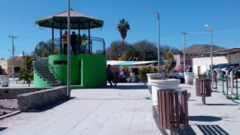Argentina embarks on a seven-day mourning period after the death of Pope Francis, whose legacy is described as one filled with love yet marked by a complex relationship with his home country. Despite never returning after becoming pope, he remained engaged with Argentine issues, leading to mixed feelings of pride and disenchantment among his compatriots.
Pope Francis' Legacy Leaves Argentina in Emotional Turmoil

Pope Francis' Legacy Leaves Argentina in Emotional Turmoil
With the passing of Pope Francis, many Argentines feel a deep sense of loss, marking both a personal and national separation from a beloved figure.
When Jorge Mario Bergoglio, known to the world as Pope Francis, departed Argentina's Buenos Aires to attend the Vatican conclave that would elect a new pope, little did he know it would be the last time he would traverse his native land. The absence of the pontiff since his ascension to the papacy has left many Argentines feeling bereft, prompting sentiments of being "orphaned." Archbishop of Buenos Aires, Jorge Ignacio García Cuerva, expressed this sentiment, stating, "We were orphans of a father who profoundly loved his country and had to learn to become the father of the whole world."
This sense of foreboding was palpable as the archbishop declared that Francis becoming pope incurred a cost for the Argentine people. When Bergoglio, who was viewed as an unlikely candidate for pope at the age of 76, stepped into his role, he commenced a papacy lasting twelve years— a tenure now marked by profound emotional loss in his homeland, with a national mourning period officially declared in Argentina.
The pontiff was beloved for his humility and simplicity, qualities that resonated with many Argentines. Elenir Ramazol, a nun, noted that his commitment to the broader Church was indicative of his dedication beyond his birthplace. Gustavo Vera, a long-time friend of Francis, shared that the pontiff maintained a vested interest in Argentine news, often commenting on cultural events while he never returned home.
Despite Francis's efforts to foster goodwill and connection, some Argentine citizens felt a disconnect over his failure to visit, especially amid a severe economic crisis characterized by soaring inflation and rising poverty. Critics of the pope, particularly from conservative factions, alleged that he strayed too far from sacred traditions while overlooking significant historical issues like the 1970s military dictatorship's abuses.
Francis had alluded to complications regarding a potential visit, expressing a desire to return not as a symbol of division but rather to foster unity among a politically fragmented nation. His passing prompted reflections on perceptions of his political leanings, with speculation around his connections to Peronism, a polarizing political movement in Argentina.
Javier Milei, the current president who has previously criticized the pope, extended condolences and acknowledged Francis's legacy of wisdom and kindness after his death. While diverse opinions exist regarding Francis's influence, many Argentines continue to feel a personal connection to the pope, viewing him as a renowned figure in their cultural landscape. The loss of Pope Francis signifies not just the passing of a religious leader, but also a poignant moment of introspection for a nation grappling with its identity and values in the wake of his departure.





















